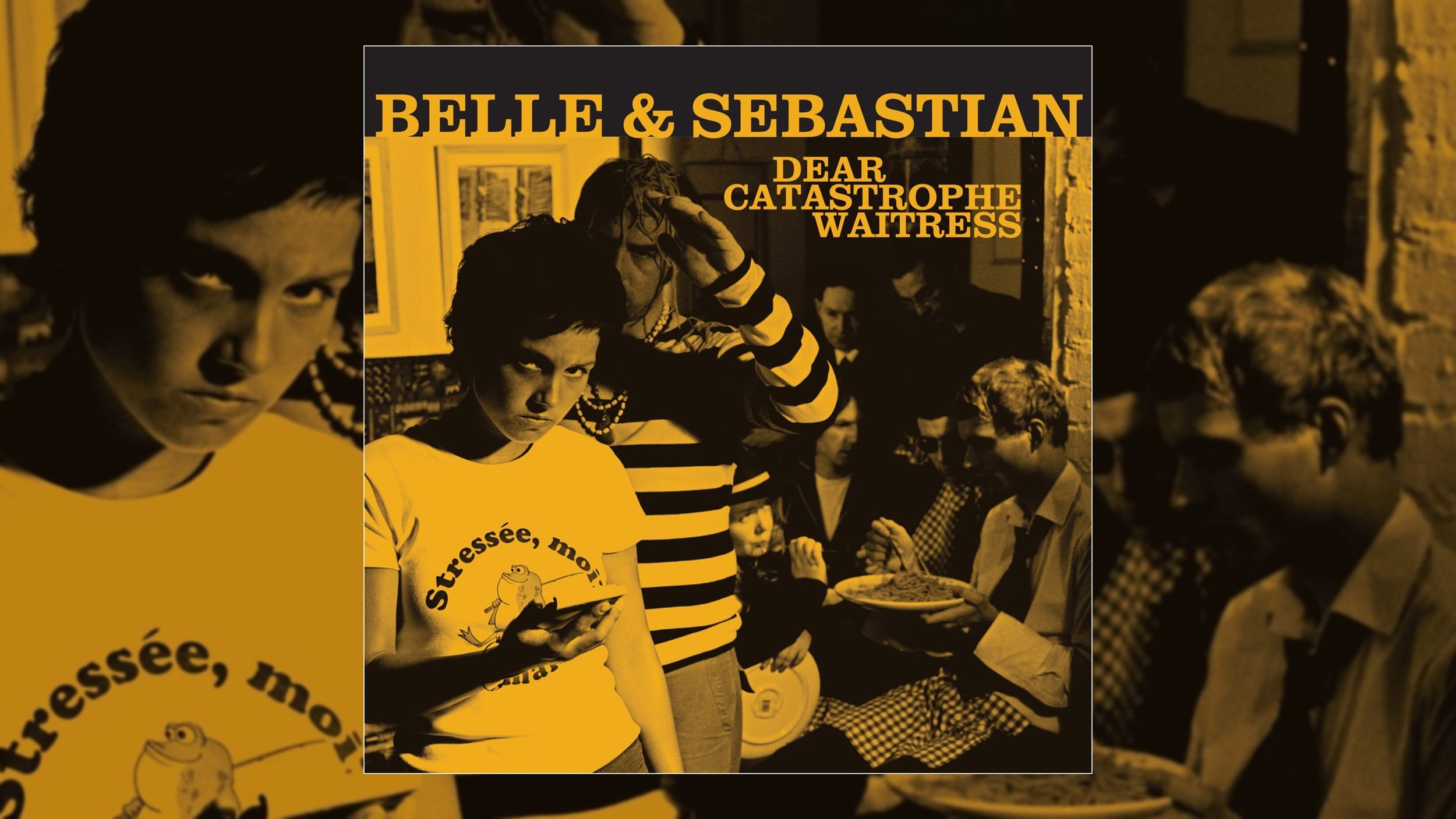Happy 20th Anniversary to Belle & Sebastian’s sixth studio album Dear Catastrophe Waitress, originally released October 6, 2003.
Belle & Sebastian’s sixth album, Dear Catastrophe Waitress, is both a return to form and an epiphany. By handing over the creative reins, the band relaxes into a format that seems comfortable and abundant with creativity. Abandoning earlier quirks, like EPs for singles and mixtape-like ways of releasing music, this album is also the first time the band brought in an outside producer, Trevor Horn.
Horn’s eclectic background, full of radio hits, helped to shape the cohesive pop sound of varied members' contributions and tastes. At first glance, Dear Catastrophe Waitress can feel like a collection of cute little earworms perfect to hum along to. However, there’s a rich complexity to the arrangements and storytelling, with lots of tenderness and intimacy.
Nostalgic indie pop is Belle & Sebastian’s sweet spot—earlier efforts to stray from this formula like The Boy With The Arab Strap (1998) are great examples of their original rock sound but with some chamber pop experimentation. The band had long adhered to a singular philosophy around recording—Stuart Mudroch leading the charge while incorporating other band members’ creative input. While democratic, these methods weren’t the best conditions for letting Murdoch’s precise narrative threads flourish. Under the watch of Horn, like a conductor with his symphony, everyone has a chance to shine, but the sum is so much greater than its individual parts.
Murdoch has an incredible talent for developing intricate worlds within a three-minute track, and Dear Catastrophe Waitress has several stunning examples. “Piazza, New York Catcher” is classic Belle & Sebastian, a personal story wrapped in imagery full of specific callouts of people and places and sparse production. “Lord Anthony” is another seemingly firsthand account, but more abstract, imagining childhood scenes, but this time under the watchful eye of one’s adult self, armed with life’s lessons. In previous outings like Tigermilk (1996) and If You’re Feeling Sinister (1996), Murdoch’s effusive storytelling has a folky background, but here it shines against a sparkly retro-pop backdrop.
Listen to the Album:
“Step Into My Office,” the first single off the album, is peak twee—a rallying call for girls with bangs and boys on fixed gear bikes. While a cheeky metaphor, pre-MeToo corporate harassment lyrics don’t age all that well, but the plucky arrangements are nostalgic enough to detract from them. It’s an iconic Belle & Sebastian track that delivers their winking charisma in spades—it’s a cuteness that runs deep throughout the album. Just as cozy as its title promises, “Asleep on a Sunbeam” is a sweet spot that passes the mic to the band’s violinist, Sarah Martin.
The swap in vocals is an important reminder of the ensemble halfway through the album and a lovely treat. The title track, “Dear Catastrophe Waitress" has a similar function—it embodies the maximalist early aughts sound, seen later in “supergroup” style bands like Broken Social Scene and The New Pornographers. In Dear Catastrophe Waitress, this chaotic format is harnessed by a coherent production style, but also by the band’s dynamics. With Stuart Davis and Isobel Campbell leaving the Belle & Sebastian fold before recording the album, it seems the trimmed and tweaked grouping was ready for a new direction and met with divine results.
The band really hits their AM radio stride with “If She Wants Me.” Murdoch’s vocals are perfect for the genre, his pleading staccato soothed by lush strings. “If You Find Yourself Caught In Love,” another referential gem, is a gleeful celebration of love. They seamlessly fall into the Motown style, but with a fresh vibrancy. “Roy Walker” is similarly ambitious in its sentimentality, but overshoots with a wacky cacophony of sound effects (clopping horses, wind chimes, a kazoo). Closing out the album, “Stay Loose,” is a funky, reggae-tinged beat that blossoms into a ‘70s psychedelic anthem. The inherent earnestness of the album also has an old-school feel—optimism this celebratory hasn’t been seen in indie rock in over a decade.
A poppy departure from their earlier folk sound, Dear Catastrophe Waitress is a charming standout in the deep Belle & Sebastian catalog. It’s work from a band secure in their relationships but adventurous in their abilities. And luckily, the Scottish indie rock group found a sonic refresh in making this tight, pop album. Mixing genres and inspiration, Dear Catastrophe Waitress remains a timeless work of art that has left an indelible mark on indie music. Its delicate blend of catchy melodies, poignant lyrics, and rich orchestration continue to captivate listeners even after 20 years.
Listen:

